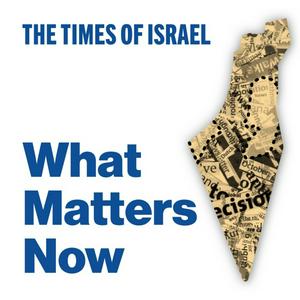Welcome to What Matters Now, a weekly podcast exploring key issues currently shaping Israel and the Jewish World, with host Jessica Steinberg speaking with Unholy podcast hosts Yonit Levi and Jonathan Freedland.
In this episode, Channel 12 news anchor Levi and Guardian columnist and BBC Radio 4's Jonathan Freedland look back on five years of podcasting together on "Unholy: Two Jews on the News," their weekly show that offers the perspectives of a Jewish Israeli and a Diaspora Jew.
Freedland and Levi discuss their intention to foster dialogue between Israel and the diaspora at a time when those conversations have become increasingly difficult.
They delve into the types of conversations carried out on "Unholy" following the October 7 Hamas terrorist attack, and how the podcast became a lifeline for them as much as their listeners, as the Jewish community worldwide has grappled with the massacre, bereavement, hostage crisis, and the war in Gaza.
The two hosts discuss their own approaches as Levi is a Jewish Israeli who spent a portion of her childhood in the US, and Freedland is a British Jew who views Judaism and Israel through his own lens.
They also chew over the intimacy of the podcast medium for them, particularly given Levi's usual role as a popular news anchor, with her face and voice familiar to most of the Israeli public. The podcast has created a setting that offers a different kind of opportunity for Levi and Freedland, their guests, and their listeners, with the capacity to foment real conversation and debate.
Levi and Freedland reminisce about earlier, favorite episodes and the years when the podcast tackled other subjects, such as musicals or literature, and with different kinds of guests, including Etgar Keret, Howard Jacobson, and Helen Mirren.
They talk about the books they each published this past year, including Freedland's 14th, a non-fiction historical thriller, "The Traitors Circle: The True Story of a Secret Resistance Network in Nazi Germany—and the Spy Who Betrayed Them."
Levi's book, her first, was written with her friend and CNN anchor Bianna Golodryga. "Don't Feed the Lion" is for middle-grade readers and Levi talks about how young people grapple with antisemitism.
What Matters Now podcasts are available for download on Apple Podcasts, Spotify, YouTube or wherever you get your podcasts. This episode was produced by the Pod-Waves.
IMAGE: Jonathan Freedland, left, and Yonit Levi are the hosts of podcast 'Unholy: Two Jews on the News' (Courtesy)
See omnystudio.com/listener for privacy information.


